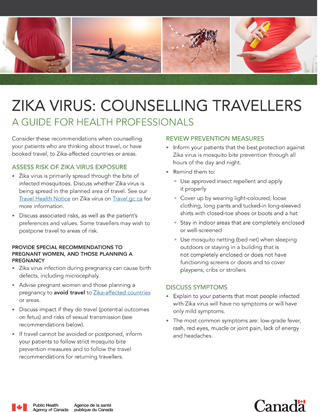Zika virus: A guide for health professionals
Counselling travellers
Consider these recommendations when counselling your patients who are thinking about travel, or have booked travel, to Zika-affected countries or areas.
Assess risk of Zika virus exposure
- Zika virus is primarily spread through the bite of infected mosquitoes. Discuss whether Zika virus is being spread in the planned area of travel. See our Travel Health Notice on Zika virus on Travel.gc.ca for more information.
- Discuss associated risks, as well as the patient's preferences and values. Some travellers may wish to postpone travel to areas of risk.
Provide special recommendations to pregnant women, and those planning a pregnancy
- Zika virus infection during pregnancy can cause birth defects, including microcephaly.
- Advise pregnant women and those planning a pregnancy to avoid travel to Zika-affected countries or areas.
- Discuss impact if they do travel (potential outcomes on fetus) and risks of sexual transmission (see recommendations below).
- If travel cannot be avoided or postponed, inform your patients to follow strict mosquito bite prevention measures and to follow the travel recommendations for returning travellers.
Review prevention measures
- Inform your patients that the best protection against Zika virus is mosquito bite prevention through all hours of the day and night.
- Remind them to:
- Use approved insect repellent and apply it properly
- Cover up by wearing light-coloured, loose clothing, long pants and tucked-in long-sleeved shirts with closed-toe shoes or boots and a hat
- Stay in indoor areas that are completely enclosed or well-screened
- Use mosquito netting (bed net) when sleeping outdoors or staying in a building that is not completely enclosed or does not have functioning screens or doors and to cover playpens, cribs or strollers
Discuss symptoms
- Explain to your patients that most people infected with Zika virus will have no symptoms or will have only mild symptoms.
- The most common symptoms are: low-grade fever, rash, red eyes, muscle or joint pain, lack of energy and headaches.
Discuss when to seek care
- Pregnant women, including those wishing to become pregnant along with their partners, those with underlying medical conditions, or those who develop more serious symptoms that could be consistent with Zika virus infection, should see a health care professional and tell them where they have been travelling or living.
Review how to prevent transmission after returning home
- Zika virus can be sexually transmitted. Review the following recommendations with female and male travellers.
- Pregnant women:
- Should always use condoms or avoid having sex for the duration of their pregnancy if their partner has travelled to an area with Zika virus.
- Women wishing to become pregnant:
- Should wait 2 months after return to Canada or after onset of illness due to Zika virus (whichever is longer) before trying to conceive to ensure that any possible Zika virus has cleared the body.
- Male travellers:
- If their partner is pregnant, should use condoms correctly and consistently, or avoid having sex, for the duration of the pregnancy.
- If they are trying for a pregnancy, should wait 3 months after return to Canada or after onset of illness due to Zika virus (whichever is longer) and use a condom correctly and consistently, or avoid having sex.
- Should use condoms or avoid having sex with they sexualpartner for 3 months after return to Canada or after onset of illness due to Zika virus (whichever is longer).
- Pregnant women:
For more information: Canada.ca/zika-virus

Download the alternative format
(PDF format, 335 KB, 2 pages)
Organization: Public Health Agency of Canada
Type: Tip sheet
Date published: 2019-01-14
Related Topics
Page details
- Date modified: